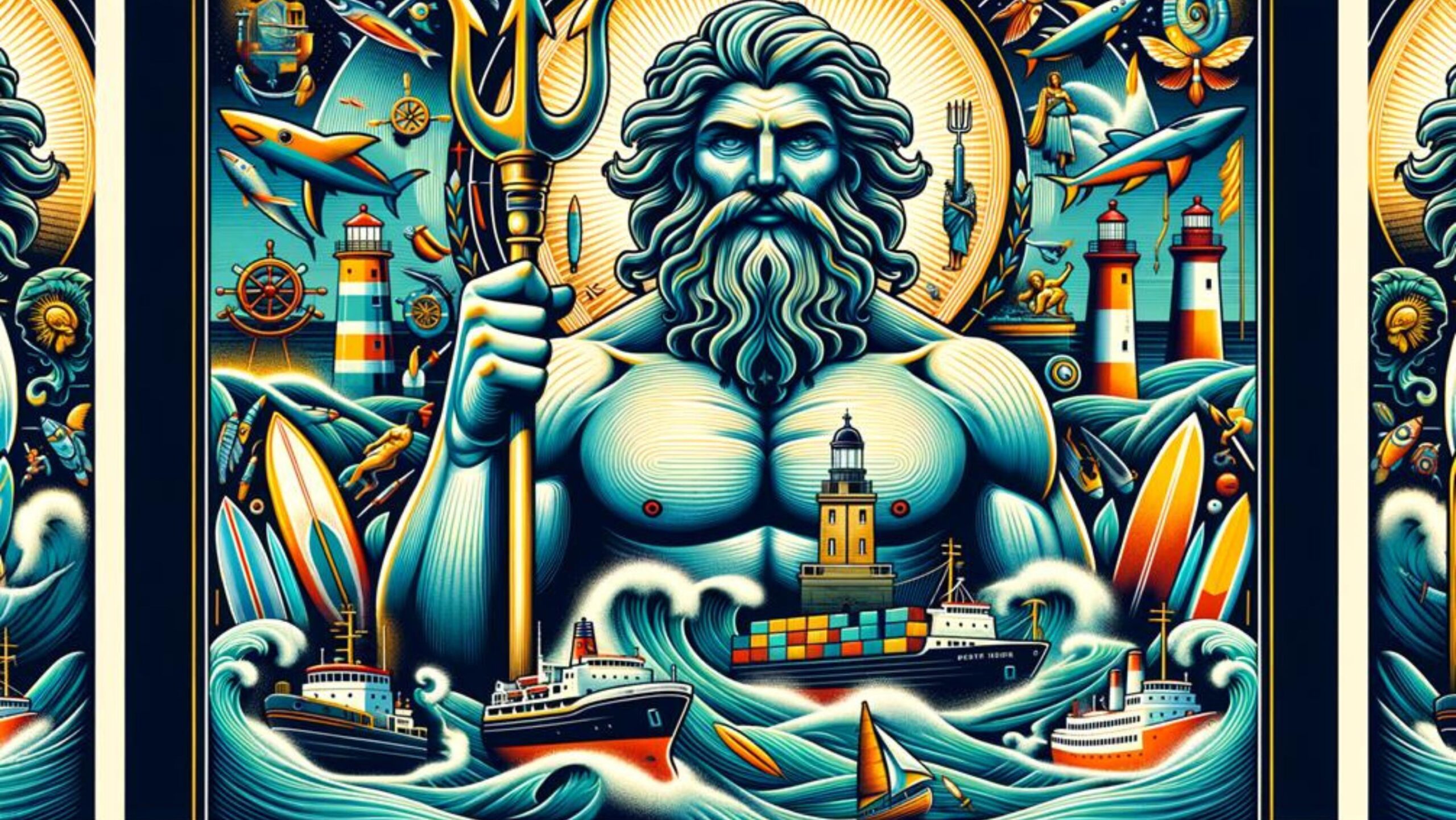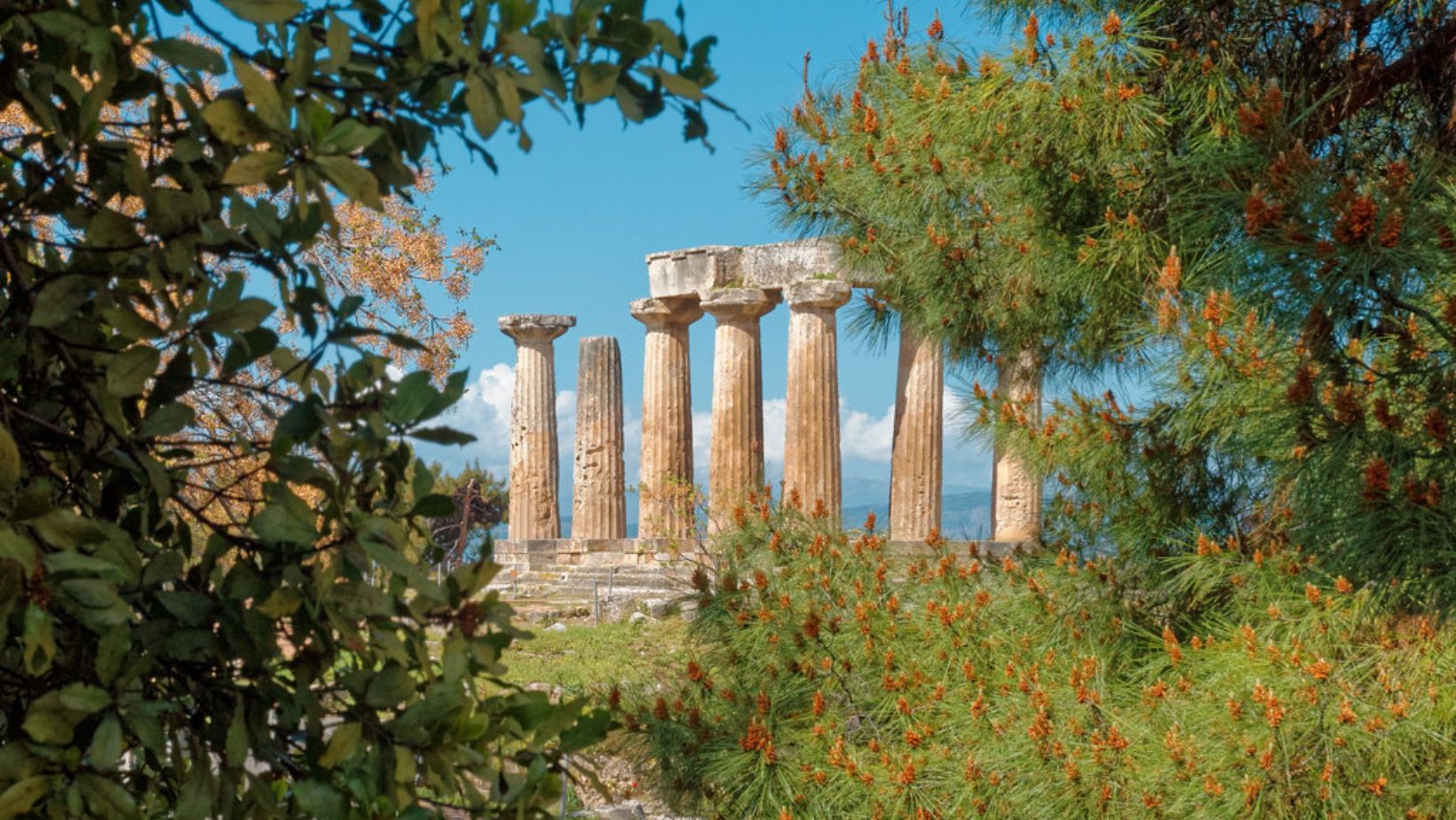You’ve heard of Zeus, Hades, and Athena – but what about Poseidon? This mighty god of the sea was no second-tier deity. Oh no, my friend. Poseidon’s Importance in Greek Mythology was a major player in the grand drama of Greek mythology.
Often depicted with his trusty trident, Poseidon wasn’t just the god of the sea. He was the master of earthquakes, the creator of horses, and a central figure in some of the most epic tales of ancient Greece. From his underwater palace, Poseidon could whip up a furious storm or calm the waves with a single word.
Table of Contents:
- Poseidon’s Role in Greek Mythology
- Poseidon’s Influence on Major Events
- Poseidon’s Relationships and Offspring
- Worship and Temples of Poseidon
- Poseidon in Art and Literature
- Poseidon’s Legacy in Modern Culture
- Conclusion
Poseidon’s Role in Greek Mythology: Poseidon’s Importance in Greek Mythology

Poseidon, the mighty Greek god of the sea, played a central role in the rich tapestry of Greek mythology. As one of the most powerful deities in the Greek pantheon, Poseidon’s influence extended far beyond the ocean’s depths, shaping the lives of gods and mortals alike.
Origins and Family
Born to the Titans Cronus and Rhea, Poseidon was the brother of Zeus and Hades. Together, they formed the triumvirate of the most powerful gods in ancient Greek religion. After overthrowing their father, the brothers drew lots to divide the world, with Poseidon gaining dominion over the seas.
Domains and Powers: Poseidon’s Importance in Greek Mythology
As the god of the sea, Poseidon held sway over the oceans, rivers, and all water bodies. He could summon storms, create islands, and cause earthquakes with his mighty trident. Sailors and fishermen worshipped Poseidon, seeking his favor for safe voyages and bountiful catches.
But Poseidon’s powers extended beyond the watery realm.
Symbols and Attributes
Poseidon’s most iconic symbol was his trident, a three-pronged spear that represented his dominion over the sea. With this mighty weapon, he could stir up storms, shatter rocks, and bring forth springs of water from the earth.
Dolphins, fish, and other sea creatures were also associated with Poseidon. In art, he was often depicted as a bearded, powerful man, sometimes riding a chariot or accompanied by his wife Amphitrite and son Triton.
Poseidon’s Influence on Major Events: Poseidon’s Importance in Greek Mythology
Throughout Greek mythology, Poseidon played a significant role in shaping the course of legendary events and the lives of heroes.
The Trojan War
In the epic Trojan War, Poseidon sided with the Greeks against the Trojans. He held a grudge against the Trojan king Laomedon, who had once cheated him of his payment for building the city’s walls. Poseidon’s intervention in the war proved decisive, as he sent a giant sea monster to ravage the Trojan coast.
The Odyssey
In Homer’s Odyssey, Poseidon plays a central role as the main antagonist to the hero Odysseus. In retaliation, Poseidon cursed Odysseus to wander the seas for ten years, facing countless perils and hardships before finally returning home to Ithaca.
Other Mythological Tales: Poseidon’s Importance in Greek Mythology
He competed with Athena for patronage of the city of Athens, which Athena won by gifting the city an olive tree. In another famous tale, Poseidon pursued Demeter, who turned herself into a mare to escape his advances. Undeterred, Poseidon transformed into a stallion, and their union produced the wild horse Arion.
Poseidon’s Relationships and Offspring: Poseidon’s Importance in Greek Mythology
Like many Greek gods, Poseidon had a multitude of consorts and children, both divine and mortal. These relationships often resulted in the birth of legendary figures and fearsome creatures.
Consorts and Lovers
Poseidon’s wife was the Nereid Amphitrite, with whom he had several children, including the merman Triton. However, the god also had numerous other lovers, such as Demeter, Medusa, and Aphrodite. Many of these unions were said to have been forced or nonconsensual.
Notable Children: Poseidon’s Importance in Greek Mythology
Poseidon fathered many famous and influential offspring. Theseus, the legendary king of Athens, was said to be Poseidon’s son. The god was also the father of Orion, the giant huntsman, and Polyphemus, the man-eating Cyclops encountered by Odysseus. Other notable children include Pegasus, the flying horse born from Medusa’s blood, and the giant Antaeus, who drew his strength from the earth.
Monsters and Creatures
In addition to his more human-like children, Poseidon was responsible for fathering or creating various monsters and mythical creatures. He also sired the monstrous Charybdis, a creature that created massive whirlpools, and the Laestrygonians, a race of man-eating giants.
These fearsome offspring added to Poseidon’s reputation as a formidable and sometimes terrifying god, capable of unleashing great destruction upon the world.
Key Takeaway: Poseidon’s Importance in Greek Mythology
Poseidon, god of the sea, wielded immense power over oceans and horses. He influenced myths like the Trojan War and Odyssey.
Worship and Temples of Poseidon: Poseidon’s Importance in Greek Mythology

Poseidon was one of the most widely worshipped gods in ancient Greece. His influence extended far beyond just the sea and sailors.
As a major deity, festivals and games were held in his honor across the Greek world. The Isthmian Games, second only to the Olympic Games in prestige, were dedicated to Poseidon.
Festivals and Games
The Isthmian Games were held every two years at the Isthmus of Corinth. They featured athletic and musical competitions that drew participants and spectators from all over Greece.
These games were so important that a truce was declared to allow athletes and visitors to travel safely to and from the event. Even in times of war, the games went on.
Held in the month of Poseideon (December/January), this festival honored the sea god in Athens and other cities.
Famous Temples: Poseidon’s Importance in Greek Mythology
Temples to Poseidon could be found in coastal cities throughout the Greek world. One of the most famous was the Temple of Poseidon at Cape Sounion.
Perched on a cliff overlooking the Aegean Sea, this 5th century BCE temple is known for its stunning location and well-preserved ruins. I remember visiting Cape Sounion at sunset and being awestruck by the view and the history.
Another notable temple was the Poseidonion at Isthmia, near Corinth.
Cult of Poseidon
The cult of Poseidon had a wide reach, with worshippers from all walks of life. Sailors and fishermen prayed to him for safe voyages and bountiful catches.
But Poseidon was also important to farmers, as he was believed to control fresh water springs. Horses were sacred to him, so equestrians and chariot racers sought his favor too.
In some cities like Corinth, Poseidon was the chief deity. Worshippers would pray and make offerings at his temples, hoping to gain his protection and blessing.
Poseidon in Art and Literature: Poseidon’s Importance in Greek Mythology
Poseidon’s importance in Greek mythology made him a popular subject in ancient art and literature. His image and stories have endured through the centuries.
Ancient Depictions
In ancient Greek art, Poseidon was often depicted as a mature, bearded man holding a trident. He was usually accompanied by dolphins or other sea creatures.
One famous example is the bronze statue of Poseidon found in the sea off Cape Artemision. Dating to the early Classical period (c. 460 BCE), this powerful sculpture captures the god’s strength and majesty.
Poseidon also appears in many vase paintings and reliefs.
Modern Interpretations
In the early 20th century, the Spanish surrealist Salvador Dalí painted “The Colossus of Rhodes”, which shows a giant Poseidon astride the harbor.
More recently, artists like Damien Hirst and Mark Wallinger have incorporated Poseidon imagery into their work. Hirst’s “Treasures from the Wreck of the Unbelievable” features a colossal Poseidon covered in coral and barnacles.
Literary References: Poseidon’s Importance in Greek Mythology
Poseidon plays a major role in many works of ancient Greek literature. Homer’s Odyssey casts him as the main antagonist, angry at Odysseus for blinding his son the Cyclops Polyphemus.
The Greek poet Hesiod’s Theogony tells the story of how Poseidon became lord of the sea. When the three sons of Cronus divided up the world, Poseidon drew the realm of the oceans as his domain.
Poseidon also appears in the works of the tragedians Aeschylus, Sophocles, and Euripides. These plays often revolve around the god’s wrath and its consequences for mortals who offend him.
Poseidon’s Legacy in Modern Culture: Poseidon’s Importance in Greek Mythology
Poseidon’s importance in Greek mythology has ensured his legacy endures in modern pop culture. From books to movies to video games, the sea god continues to make waves.
Books and Comics
Rick Riordan’s Percy Jackson series has introduced Poseidon to a new generation of fans. In the books, Percy is a demigod son of Poseidon who inherits his father’s powers over water.
The series, which started with The Lightning Thief in 2005, has sold millions of copies worldwide.
Poseidon has also appeared in comic books like DC’s Aquaman. In some storylines, Aquaman is the son of Poseidon, drawing on his divine heritage for his aquatic superpowers.
Films and Television
Poseidon has been portrayed in many movies and TV shows based on Greek myths. In the original Clash of the Titans (1981), he’s played by Jack Gwillim. The 2010 remake stars Danny Huston as the sea god.
Television has also showcased Poseidon. The Odyssey miniseries (1997) features Michael J. Pollard as a mercurial, trident-wielding Poseidon. In Hercules: The Legendary Journeys and Xena: Warrior Princess, he’s played by Charles Siebert.
Video Games: Poseidon’s Importance in Greek Mythology
Video games have let players experience Poseidon’s might firsthand. In the God of War series, he’s a recurring boss battle, fighting the protagonist Kratos.
The game Smite features Poseidon as a playable character, with abilities like summoning whirlpools and riding tidal waves into battle. Age of Mythology also includes Poseidon as one of the major gods players can worship for divine favors.
These modern interpretations prove that Poseidon still has the power to capture our imaginations. His influence extends far beyond the pages of dusty mythology books. Poseidon remains an icon of the sea, an enduring symbol of the raw power and mystery of the oceans.
Key Takeaway: Poseidon’s Importance in Greek Mythology
Poseidon was a widely worshipped god in ancient Greece. His influence reached beyond the sea, with festivals like the Isthmian Games held in his honor. Temples and cults dedicated to him spanned coastal cities, highlighting his importance to sailors, farmers, and equestrians alike.
Conclusion: Poseidon’s Importance in Greek Mythology
Poseidon’s importance in Greek mythology cannot be overstated. As one of the twelve Olympians, he wielded immense power over the sea, earthquakes, and horses. His influence touched nearly every aspect of ancient Greek life, from seafaring and trade to warfare and religion.
Through his myths and worship, Poseidon shaped the cultural landscape of ancient Greece. His legacy endures to this day, immortalized in art, literature, and the very ruins of his once-great temples.
So the next time you hear a rumble of thunder or feel the earth tremble beneath your feet, remember Poseidon, the mighty god of the sea. His presence still echoes through the ages, a testament to his enduring importance in the fascinating world of Greek mythology.

